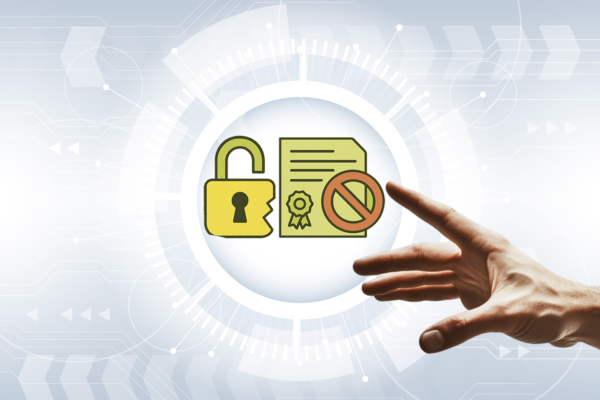
When Digital Certificates Are Revoked: What Subscribers Need to Know
“Why is my SSL certificate revoked?”That’s a question that no one wants to have to ask unexpectedly, but it does occasionally happen. Digital certificate revocations can severely hinder your day-to-day business operations. While the revocations may initially appear unwarranted, it is vital to understand that CAs such as SSL.com must often revoke expired certificates to comply with stringent industry standards.
This process protects you, your business, and your customers from potential threats. When certificates go beyond their validity period and may become compromised, it opens the door for attackers to create fake certificates for legitimate websites, putting sensitive data at risk.
If your organization relies on publicly trusted certificates, learn how to protect and manage your operations if and when revocations occur. These best practices can help you stay on top of digital certificate management and avoid certificate revocations altogether.
Protect against certificate authority disruptions with a backup CA service
Why Mass Certificate Revocations Happen
Every public CA must comply with the Baseline Requirements the CA/Browser Forum sets. These rules are non-negotiable and designed to protect the trust and integrity of the internet’s encryption infrastructure. Revocation occurs under certain conditions, including: - Private key compromise – An unauthorized individual or party gains access to or control of an organization’s private key through theft, loss, or exposure
- Improper domain validation – This typically happens when there’s a mismatch between the public key and private key registered with the parent domain; Additionally, incorrect DNS propagation, formatting, or verification codes can lead to validation problems
- Misissued certificates – Also known as rogue certificates, these can occur due to several factors, including CA breaches, human error, or security vulnerabilities in the certificate management process.
- Violations of the CA’s Certificate Policy (CP) or Certification Practice Statement (CPS) – This can happen through various factors, including failing to follow the defined processes for issuance, failing to maintain the required security measures, or using issued digital certificates for unauthorized purposes.
As subscribers, diligence is required on your end to manage your certificates with potential revocations in mind. Even if it’s inconvenient, the CA doesn’t have a choice when a revocation is needed.
How to Avoid and Manage Digital Certificate Revocations
- Use Multiple Certificate Authorities – Avoid depending on a single Certificate Authority. A secondary CA provides more options and flexibility when one provider is forced to revoke.
- Automate Certificate Management – Tools like SSL.com’s ACME automatically handle issuance, renewal, and replacement, which can drastically reduce downtime during revocations.
- Monitor CA Communications and Bulletins – Stay aware of policy updates, CP/CPS changes, and potential incidents that could affect your certificates with SSL.com’s Health Check Monitoring (HCM).
- Keep Replacement Certificates Ready – Pre-issued or quickly issuable certificates should be part of your business continuity plan.
- Test Revocation Response Drills – Like disaster recovery testing, simulate a sudden certificate revocation to help assess your team’s response readiness.
- Use a Backup Certificate Authority – With a backup CA strategy, you can build agility into your certificate infrastructure to help avoid risks such as operational and service disruptions and compliance violations.
Prioritize Proactive Over Reactive Management Measures
When a CA revokes certificates, it’s not optional. Instead, it’s a matter of compliance. Preparing for this reality is the responsibility of every subscriber. While mass revocations might be rare, there are usually indicators that it is looming on the horizon and that valid certificates are reaching the end of their lifecycle. While mass revocations are rare, there are often looming signs that they’re on the horizon, especially as valid certificates approach expiration dates.Securing your systems properly, having diligent administrators to oversee complex certificate environments, and staying on top of renewals are great ways to prevent digital certificate revocations. A proactive mindset will help ensure a smoother recovery and drastically reduce any critical business interruptions if the unexpected happens.
Protect against certificate authority disruptions with a backup CA service
Need help strengthening your certificate lifecycle strategy?
Our team can help you set up multi-CA resilience, automation, and recovery plans tailored to your infrastructure. Connect with our SSL/TLS certificate specialists to discuss the best solutions to protect your business from avoidable downtime.